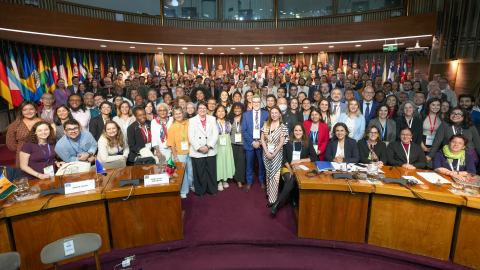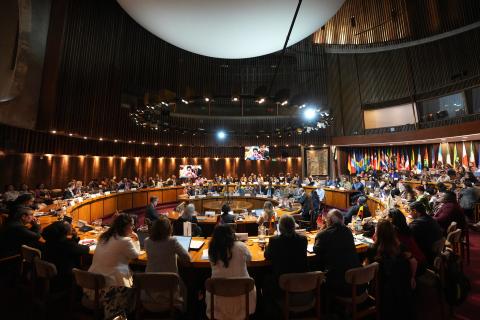Press Release
The latest good tidings confirm that we are living through a change of era in Latin America. The building of peace will be the great force behind and the opportunity for progressive structural change, with equality, which will embrace as its own the goals of sustainable development.
With the signing of the agreement between the Colombian government and the Revolutionary Armed Forces of Colombia (FARC) this September 26 in Cartagena de Indias, a historic act that I had the opportunity to witness, the region consolidates itself as an area of peace and the Colombian people advance with firm and decisive steps on the construction of democratic institutions.
This long-awaited agreement, the result of dialogue and diplomacy, is the expression of a social compact for reconciliation, integration and development. With ratification expected at the ballot boxes on October 2, its implementation will undoubtedly bring greater possibilities for equality, justice and dignity for all. At the Economic Commission for Latin America and the Caribbean (ECLAC), we celebrate with great pride and joy the auspicious future that opens for Colombia.
The country’s economic and social conditions have improved greatly in recent decades, although we know that many of its citizens still suffer conditions of vulnerability and inequality. According to ECLAC’s data, nearly half of all Colombians (49.7%) were in situations of poverty in 2002. By 2014, that indicator had fallen to 28.6%, a figure that demands ongoing determined action against this scourge, but also shows an encouraging decline.
Since the year 2000, Colombia has maintained a sustained growth rate, with annual increases in Gross Domestic Product (GDP) that have oscillated between 1.7% and 6.9% in that period. In 2015, the country achieved an expansion of 3.1% and, according to our organization’s projections, it should end 2016 with a 2.7% increase. With a total of 12.108 billion dollars, Colombia was also the fourth-biggest recipient of Foreign Direct Investment (FDI) in Latin America and the Caribbean in 2015.
Colombia’s institutions have shown their potential for carrying out structural changes—albeit with ups and downs—that have been central state policies, such as betting on macroeconomic stability, environmental institutional advances, the participation of civil society, development planning, and the fight against organized crime.
The paths to peace are the force for transformation that Colombia will have in the coming years. The route that it begins to tread also coincides with the implementation of the 2030 Agenda for Sustainable Development, which was approved in 2015 by the United Nations General Assembly. Colombia showed early leadership in its formulation and incorporated a significant number of its goals into its 2014-2018 Development Plan.
In light of the challenges seen for today and tomorrow, set forth in the 2030 Agenda, ECLAC offers as a contribution to that strategic road map the contents of the document Horizons 2030: Equality at the Centre of Sustainable Development, presented last May in Mexico. This text proposes an integrated approach to development, with virtuous paths and links, present in the agenda of all the public and social actors of Colombia and of its regions.
At ECLAC we renew our commitment to continue accompanying Colombia’s efforts to consolidate definitive peace and carry out its own national development project.
We also reiterate our recognition of the Governments of Cuba and Norway, the guarantor countries of the process, as well as Chile and Venezuela, who accompanied the peace talks. All of their efforts have written one of the most brilliant chapters in history of collective commitment to our best civilizing values.
We also recognize the leadership that President Juan Manuel Santos and Foreign Affairs Minister María Ángela Holguín showed at this complex time.
We trust now that the international community, and the region’s countries especially, will continue supporting Colombia in the implementation of the accords. In this beautiful undertaking they can always count on ECLAC’s good will and capacities.


